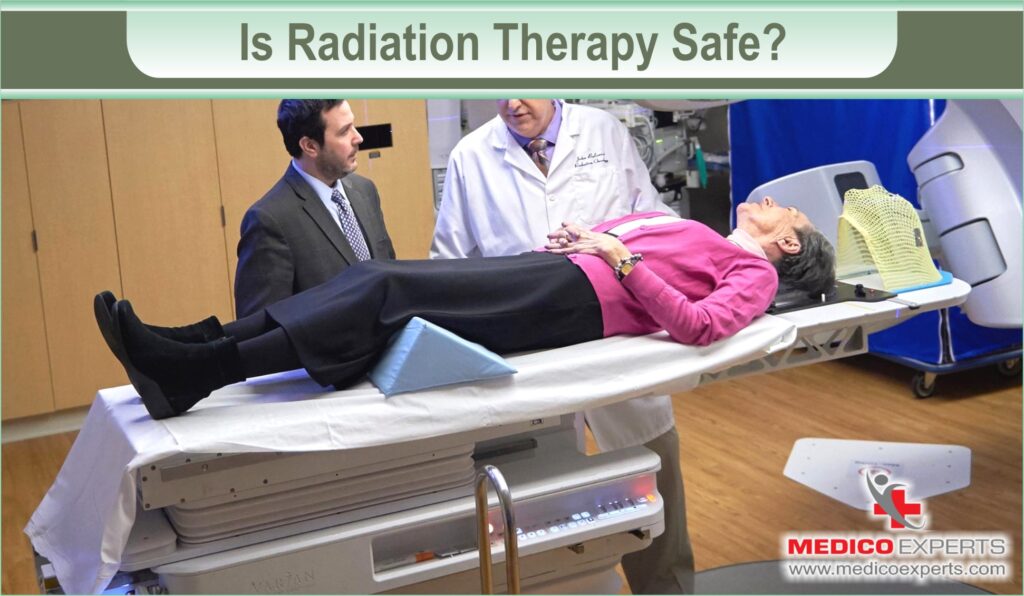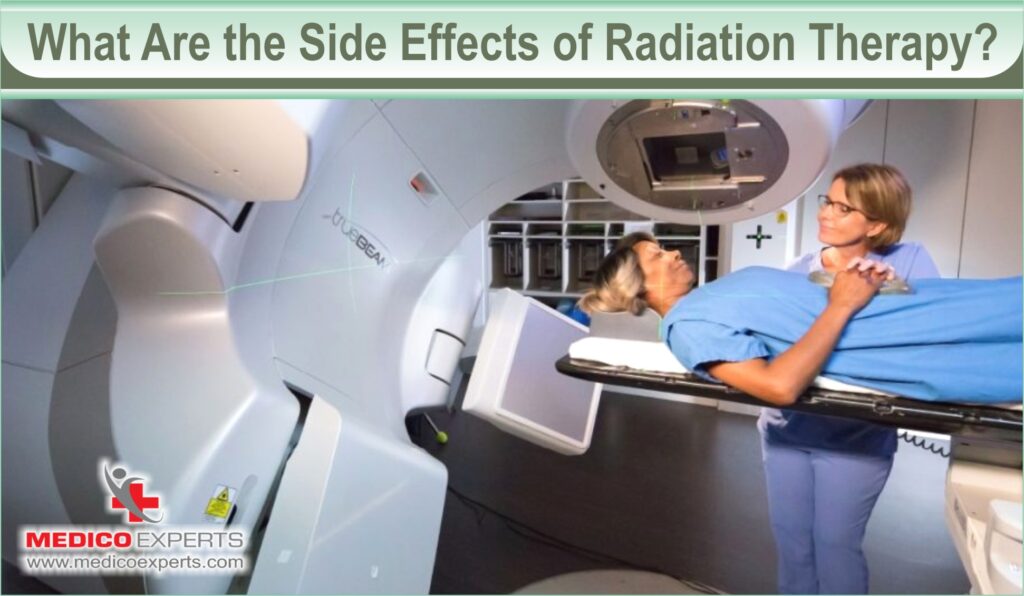Is radiation therapy safe? you might have this question in your mind if you are planning to go for radiation therapy.
In that case, you should know that radiation therapy is widely used for treating different types of cancers and can be safe when properly administered. Cancer is one of the leading causes of death in the world and treatment options come with their own set of risks and benefits. Radiation therapy is a common treatment for many types of cancers, and one of the least invasive.
While it can be an effective way to treat cancer, it is important to understand how safe it is before making a decision.
What is Radiation Therapy?

Cancer cells are targeted and killed using high-energy beams in radiation therapy. It is typically used in combination with other treatments such as chemotherapy or surgery.
Radiation therapy, also known as radiotherapy, is a precise cancer treatment that uses intense energy beams to kill cancer cells while sparing healthy tissues. It commonly utilizes X-rays, but proton radiation is also an option. This modern method aims to target cancer directly, ensuring minimal exposure of healthy tissues to high doses of radiation.
Radiation therapy can be administered internally or externally. The most common form is external beam radiation therapy, which utilizes a linear accelerator machine to deliver high-energy beams precisely to the targeted area of the body.
Learn more about different types of cancer here…
Is Radiation Therapy Safe?

Radiation therapy, a common treatment for cancer, often raises safety concerns. However, it has a long history of safe use spanning over a century. Advances in technology and stringent safety regulations have made radiation therapy safer than ever before. Here’s a detailed overview:
Radiation therapy has been safely used for cancer treatment for more than 100 years. Continuous advancements in technology and safety regulations ensure patient safety during treatment. Treatment centers adhere to strict rules and guidelines to safeguard patients, healthcare workers, and visitors.
What Are the Risks Associated with Radiation Therapy?

Radiation therapy targets a specific area of the body and can lead to various side effects. Here’s a simplified breakdown:
Common Side Effects
- Skin Changes: Dryness, itching, blistering, or peeling may occur in the treated area. These usually resolve a few weeks after treatment, but if severe, your doctor may adjust your plan.
- Fatigue: Feeling exhausted despite enough rest is common, especially with combined treatments like radiation and chemotherapy.
- Long-Term Effects: Some effects may persist or develop later, such as a low risk of a second cancer.
Site-Specific Side Effects
- Head and Neck: Dry mouth, mouth sores, difficulty swallowing, and hair loss can occur.
- Chest: Swallowing difficulty, shortness of breath, breast soreness, and lung-related issues like cough and scarring may happen.
- Stomach and Abdomen: Loss of appetite, nausea, cramping, and bowel changes may occur but usually resolve post-treatment.
- Pelvis: Digestive issues, rectal bleeding, bladder irritation, sexual problems, changes in menstruation, and fertility issues may arise, depending on the treatment area.
Your doctor can prescribe medications and dietary changes to manage these side effects effectively.
What Are The Different Types of Radiation Therapy?

Different types of radiation therapy may be used depending on the type and stage of cancer.
The most common forms of radiation therapy are external beam radiation therapy, internal radiation (or brachytherapy), and stereotactic body radiation therapy (SBRT). Other specialized forms include proton therapy, intensity-modulated radiation therapy (IMRT), and image-guided radiation therapy (IGRT).
Let us see them in detail:
a. The External beam radiation therapy
External beam radiation therapy is the most common form of radiation treatment used to treat cancer. It involves a linear accelerator that delivers high-energy X-ray beams directly to the tumor site from outside the body.
b. The Internal form of radiation therapy
Brachytherapy is an internal form of radiation therapy that utilizes tiny radioactive implants placed in or near the tumor. The implants deliver radiation in short bursts over a few days or weeks, minimizing exposure to healthy tissues.
c. Stereotactic body radiation therapy (SBRT)
The internal is an advanced form of external beam radiation therapy that delivers powerful targeted beams of radiation to tumors with greater precision and accuracy than traditional methods.
d. Proton therapy
Proton therapy uses high-energy protons to target cancer cells with greater precision than traditional X-ray beams, minimizing the risk of damage to healthy tissue.
e. Intensity-modulated radiation therapy (IMRT)
Intensity-modulated radiation therapy (IMRT) is an advanced form of external beam radiation that can be used to precisely target tumors while minimizing exposure to healthy tissues.
f. Image-guided radiation therapy (IGRT)
Image-guided radiation therapy (IGRT) combines imaging technology with radiation therapy to ensure the accurate delivery of high-energy beams to tumors.
What Are the Side Effects of Radiation Therapy?

The risks of radiation therapy are relatively small compared to the potential benefits.
Common side effects of radiation therapy include:
- Skin irritation,
- Fatigue,
- Nausea, and
- Hair loss.
These symptoms are usually mild to moderate and tend to improve or disappear shortly after the treatment is completed.
More serious side effects may include:
- Tissue scarring,
- Damage to internal organs,
- Secondary cancers, and
- Infertility.
It is important to discuss these risks with your doctor before beginning treatment.
Different Cancers treated with different types of radiotherapy?

A wide variety of cancers can be treated with radiation therapy, including:
- Prostate cancer
- Breast cancer
- Lung cancer
- Blood cancers, such as leukemia and lymphoma
- Neuroblastoma
- Ovarian cancer
Different types of radiation therapy may be recommended for different types of cancers.
For example, proton therapy may be recommended for prostate cancer due to its ability to precisely target tumors while minimizing exposure to healthy tissues. Brachytherapy is also commonly used to treat prostate cancer.
External beam radiation therapy is often used for breast cancer, lung cancer, and neuroblastoma, while brachytherapy may be used for ovarian cancer.
When it comes to treating blood cancers such as leukemia and lymphoma, radiation therapy is often combined with chemotherapy in order to maximize the effectiveness of the treatment.
Conclusion
Radiation therapy is a safe and effective option for many types of cancer. Its side effects are usually mild to moderate, and the potential benefits may outweigh the risks.
Medicoexpert’s Tumor Board is dedicated to providing comprehensive and accurate information about radiation therapy and its safety profile. With the help of advanced technology, they are committed to helping cancer patients make informed decisions about their treatment options.
If you’re considering radiation therapy as a possible treatment for your cancer, talk to your doctor or contact Medicoexpert’s Tumor Board for more information. They can provide you with the resources and support needed to make an informed decision.
Radiation therapy continues to be a reliable option for many types of cancer, but it is important to take into account its safety profile when making your treatment decisions.
Book an appointment with our team today.
Remember – knowledge is power when it comes to battling cancer!
FAQ :
Q1. Is radiation therapy painful?
A. No, radiation therapy is not painful. You may experience some mild side effects such as skin irritation or fatigue, but these usually improve after the treatment is completed.
Q2. How long does radiation therapy last?
A. Radiation therapy typically lasts for several weeks or months depending on the type of cancer being treated and the amount of radiation required to target it. Your doctor can provide you with more information about the specific duration of your treatment plan.
Q3. What is the success rate of radiation therapy?
A. The success rate of radiation therapy depends on the type and stage of cancer being treated, as well as the dosage and duration of treatment. However, research suggests that it can be an effective option for many cancers.
Q4. Difference between radiation therapy and chemotherapy?
A. Radiation therapy and chemotherapy are both used to treat cancer, but they work in different ways.
Radiation therapy uses high-energy X-ray beams to target and destroy cancer cells, while chemotherapy is a systemic treatment that uses drugs or other chemical agents to kill cancer cells.
Q5. Cost of radiation therapy?
A. The cost of radiation therapy depends on the type and stage of cancer being treated, as well as the duration and intensity of treatment. Connect with Medicoexpert’s Tumor Board to discuss your individual needs and develop a treatment plan that fits within your budget.
References
https://www.cancer.gov/about-cancer/treatment/types/radiation-therapy
https://www.ncbi.nlm.nih.gov/pmc/articles/PMC5535674/



